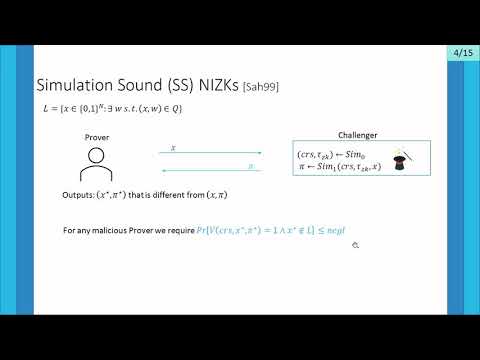CryptoDB
Simulation-Sound Arguments for LWE and Applications to KDM-CCA2 Security
| Authors: | |
|---|---|
| Download: | |
| Abstract: | The Naor-Yung paradigm is a well-known technique that constructs IND-CCA2-secure encryption schemes by means of non-interactive zero-knowledge proofs satisfying a notion of simulation-soundness. Until recently, it was an open problem to instantiate it under the sole Learning-With-Errors (LWE) assumption without relying on random oracles. While the recent results of Canetti et al. (STOC'19) and Peikert-Shiehian (Crypto'19) provide a solution to this problem by applying the Fiat-Shamir transform in the standard model, the resulting constructions are extremely inefficient as they proceed via a reduction to an NP-complete problem. In this paper, we give a direct, non-generic method for instantiating Naor-Yung under the LWE assumption outside the random oracle model. Specifically, we give a direct construction of an unbounded simulation-sound NIZK argument system which, for carefully chosen parameters, makes it possible to express the equality of plaintexts encrypted under different keys in Regev's cryptosystem. We also give a variant of our argument that provides tight security. As an application, we obtain an LWE-based public-key encryption scheme for which we can prove (tight) key-dependent message security under chosen-ciphertext attacks in the standard model. |
Video from ASIACRYPT 2020
BibTeX
@article{asiacrypt-2020-30671,
title={Simulation-Sound Arguments for LWE and Applications to KDM-CCA2 Security},
booktitle={Advances in Cryptology - ASIACRYPT 2020},
publisher={Springer},
doi={10.1007/978-3-030-64837-4_5},
author={Benoît Libert and Khoa Nguyen and Alain Passelègue and Radu Titiu},
year=2020
}

